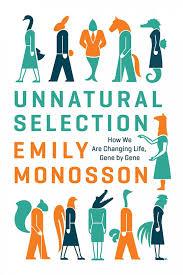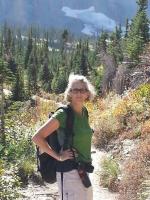Monosson: Unnatural Selection
HOW WE ARE CHANGING LIFE GENE BY GENE
Emily Monosson
Island Press, October 2014, Hardcover $30; Ebook $29.99
ISBN: Hardcover 9781610914987; Ebook 9781610915007
Monosson writes:
I am an environmental toxicologist. I have written a column called The Neighborhood Toxicologist for my local newspaper for years, explaining why certain chemicals are toxic, and how the body responds to these chemicals. I explored these topics in my earlier book, Evolution in a Toxic World (Island Press).
That book is fairly technical, however. After nearly 20 years of teaching, consulting, research, and, more recently, blogging, I wanted to write and share with a larger audience what we know, and don't know, about toxic chemicals.Unnatural Selection: How We Are Changing Life Gene by Gene grew out of a chapter in Toxic World on how species can evolve resistance to industrial age chemicals. In Unnatural Selection, I aim to increase the general reader’s understanding of rapid evolution across levels of biological organization from viruses to humans. I explore resistance to antibiotics, chemotherapy and Roundup, resurgence of bedbugs, evolution in response to pollutants, epigenetics, and other topics.
Because my experience with Island Press had been positive, I did not look for an agent for this book. I submitted a proposal to Island with one full chapter; Island accepted it.
My goal was to produce a chapter a month. I conducted my research mainly from home, using Web of Science, popular science articles to identify timely and interesting publications, and Wikipedia to identify historical citations. I love roaming library stacks, so I usually have a pile of books by my desk. I interviewed 17 scientists, roughly two for each of the eight chapters. My sources included oncologists, entomologists, and evolutionary biologists, as well as a few individuals with interesting and relevant experiences.
I conducted most of the interviews by phone, with some email follow-up. As a scientist trying to make the transition to writer, I know I need to develop my interviewing skills further. For my next book project, I plan to conduct more interviews in person, and work on capturing more of the atmosphere in which the research is performed, as well as personalities of my subjects.
Contact info:
- Emily Monosson, 413-522-1937, emonosson@gmail.com
- Author’s website: https://emilymonosson.wordpress.com
- Publicist: Jaime Jennings, 202-232-7933 x44, jjennings@islandpress.org
- Book website: http://islandpress.org/unnatural-selection
- Blog website: https://toxicevolution.wordpress.com
NASW members: will your book be published soon? Take advantage of this opportunity for shameless self-promotion.
Tell your fellow NASW members how you came up with the idea for your book, developed a proposal, found an agent and publisher, funded and conducted research, and put the book together. Include what you wish you had known before you started this project, or had done differently.
See https://www.nasw.org/advance-copy-submission-guidelines.
Send info and images to Lynne Lamberg, NASW book editor, llamberg@nasw.org.


